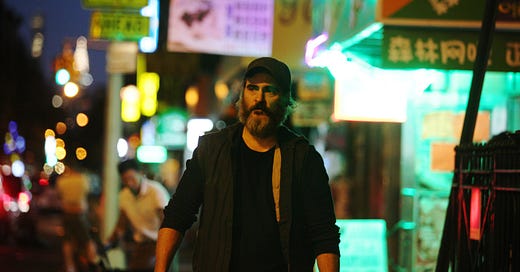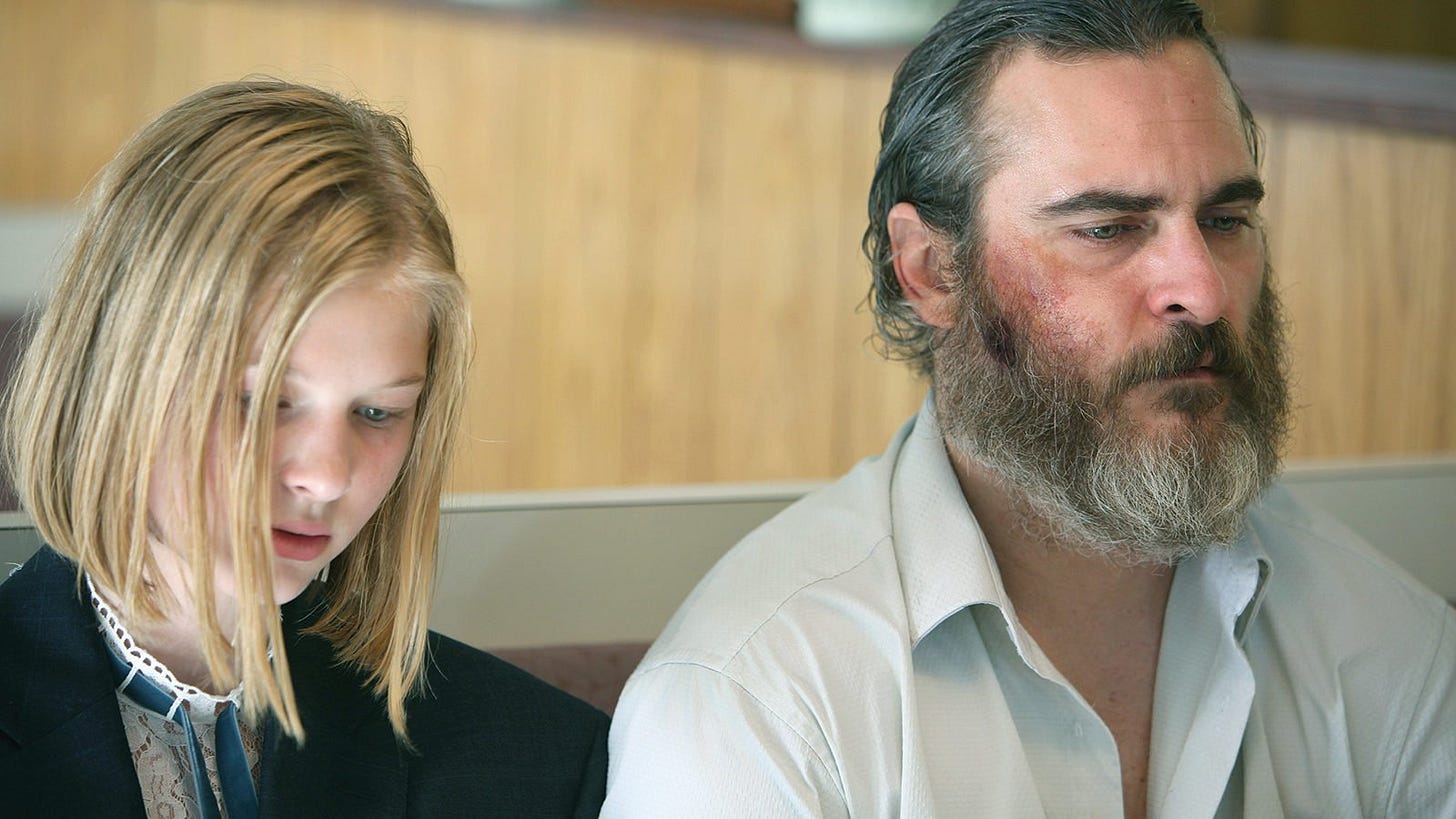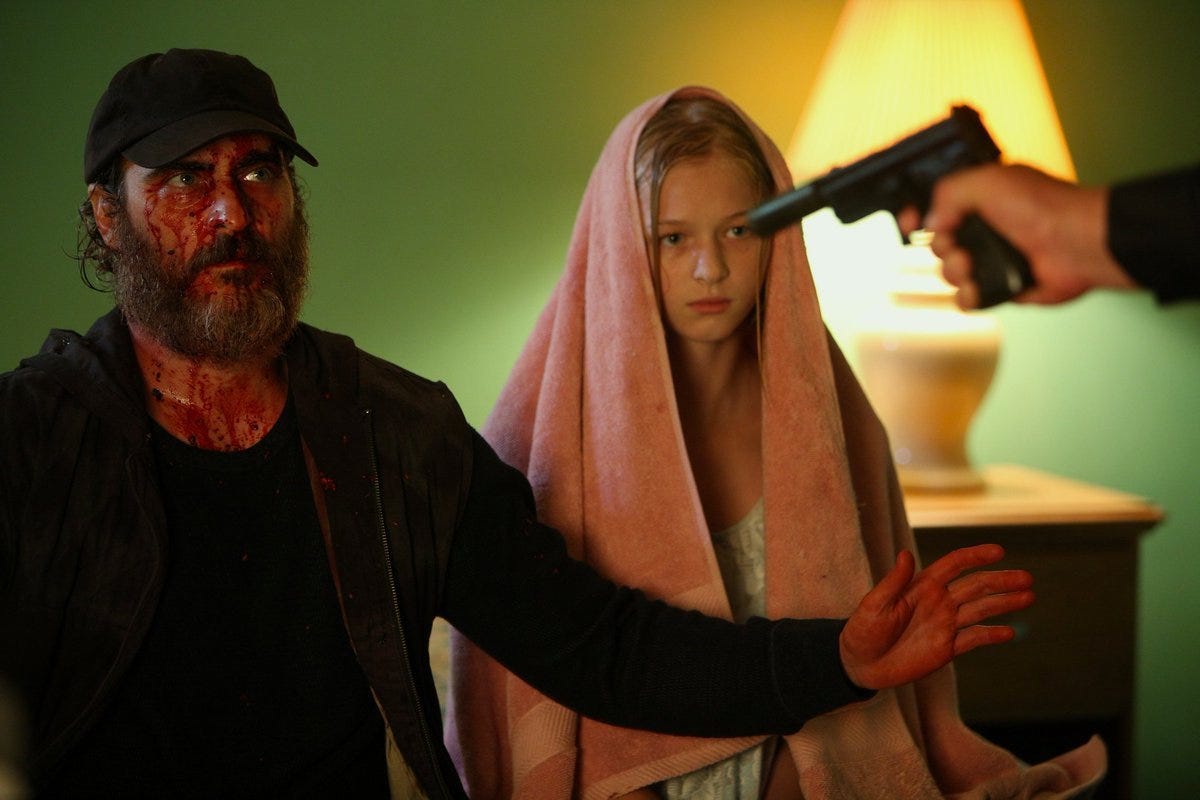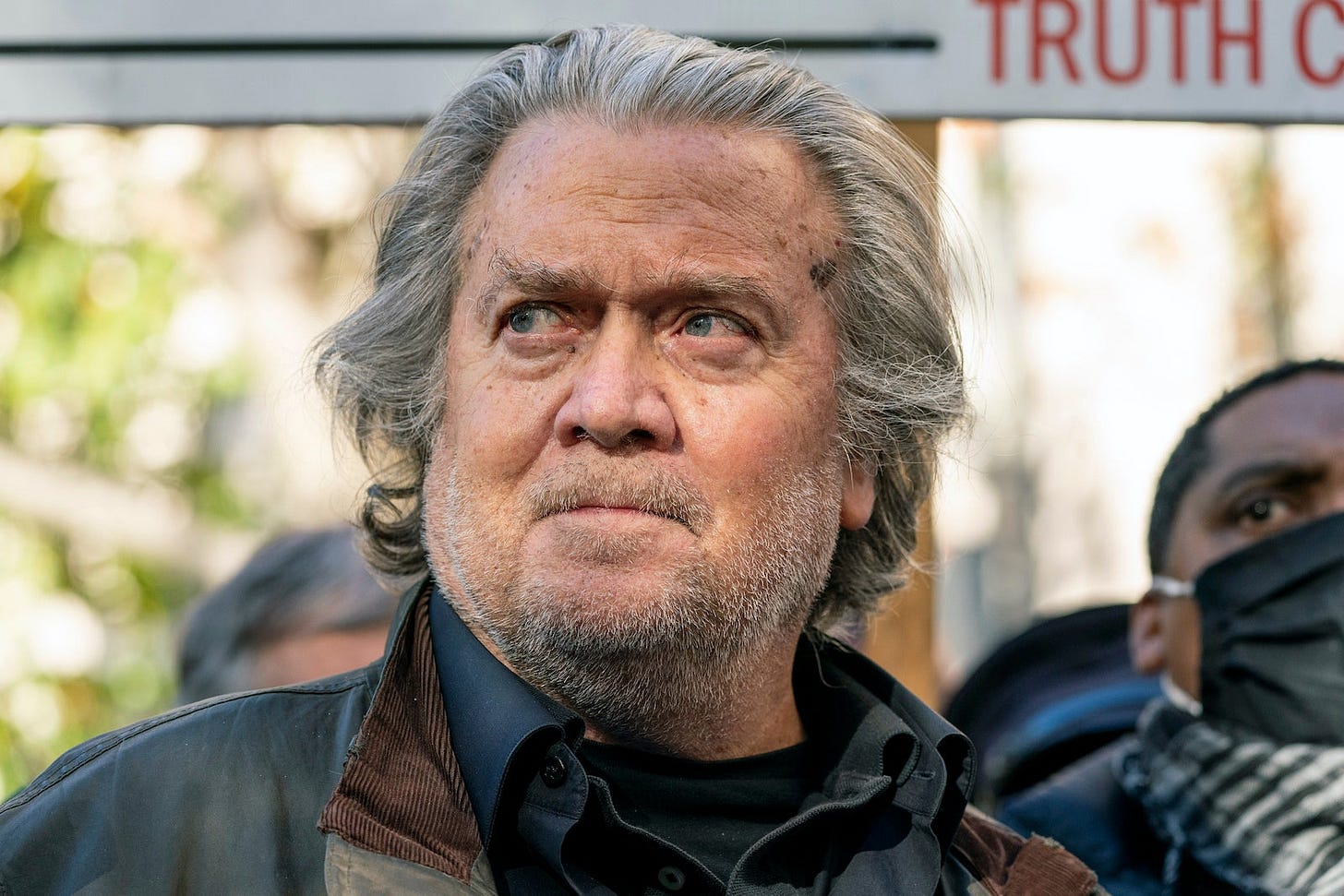There’s a type of filmmaking that embraces austerity when embracing genre motifs. Maybe you could call it “Sparse Thrills”, taking a high-wire concept and focusing on smaller, more human details while actively ignoring or even deleting the more predictably “entertaining” moments. A solid example of “Sparse Thrills” is the excellent Tobias Lindholm thriller “A Hijacking”, which is about a “Captain Phillips”-style kidnapping standoff involving a container ship out at sea. It’s a simple recipe for suspense, but much of the film’s runtime is devoted to stony-faced executives at the oil company, all of whom are negotiating exactly how much their employees are worth to them in the face of piracy. There is no heroic rescue in that narrative.
The title of “A Hijacking” is a glib reference to exactly what sort of thrills exist therein. You could be similarly glib about “You Were Never Really Here”, Lynne Ramsay’s disturbingly violent tale of a man of few words who deals out revenge against unquestionably-evil men. You’ve seen this movie with many titles, starring a wide collection of leading men. It’s an open question as to whether you’ve seen it as bleak and hopeless as this, as dirty and grimy and dense with the weight of a failed society, like a ceiling that’s collapsed over a house of oblivious junkies.
Joaquin Phoenix, continuing what seemed like an explosive decade-long run of roles, appears here as Joe. “Appears” is the word I’m going to use, because “acts” or “performs” seems like an unsatisfactory descriptor. Joe is a character who has served in law enforcement in some capacity, though it appears to have hollowed him out like a Halloween pumpkin. His beard hangs off his face like a beehive off a low-hanging branch. His eyes are like a massive fishbowl, empty save for the lone goldfish near-imperceptibly zipping left and right. Joe seems less of a man and more like a revenant, a tornado you can call to desolate farmlands.
Joe lives a modest life in upstate New York with his mother, whom you get the sense is the only person that can make Joe smile. Joe doesn’t smile much, due to what seems like a part-time job – he is routinely the blunt instrument used to punish sex traffickers. This takes him to the doorstep of a Senator, one who has a missing preteen daughter. There is a brothel of young girls in the middle of Manhattan, and Joe is going to enter and exit with the asset.
If it were that simple, there would be no movie. Ramsay, a filmmaker who excels in dread-soaked atmosphere, knows what to obscure and what to strip naked. Joe’s weapon of choice ends up being a hammer, which suits his blunt-force entry and exit. There are no cute disguises, no tricks, and seemingly no survivors. He’s a dog, one that willingly removes his leash to do damage. It’s a dangerous film in that it embraces the common notion of the lone wolf white guy fighting against conspiracies, desperate to protect kids.
But Joe is no hero. There’s no satisfaction in what he does. Joe was a bullet in the chamber for the cops, and now he’s a bullet in the chamber for forces unseen. The girl he rescues gloms onto him, but not because of his charm or bedside manner. He has no actual affection for children, doesn’t have one of his own. He is, for the most part, a pet rock to a little girl. This is a disorienting movie, though it is one of those types of pictures where the title needs to be taken into account by the viewer moreso than the concrete events of the movie.
Ramsay is an uncompromising filmmaker known for what, I get the sense, is a type of aggression Hollywood only accepts from male auteurs. It’s kept her from realizing cinematic visions to the point where she’s only taken off the board every eight to ten years. It was six years between the bleakly-entertaining dark comedy “We Need To Talk About Kevin” and “You Were Never Really Here”. In the meantime, she developed “Jane Got A Gun”, a western she later abandoned over what sounded like stark creative differences. A lawsuit made Ramsay sound as if she was a menace during pre-production, though the behavior described therein would have made Ridley Scott the life of the party. They settled out of court. Now, another eight years after this film, she’s got “Die My Love” coming this year, and hopefully a few more projects ready to go soon. A Lynne Ramsay film is a must-see for me, and I’m glad I got to watch one as part of this grand assignment.
Joe is an infamous archetype men (particularly white men) love: the good (white) guy with a gun. It’s why so many white lawmakers can sell their constituents on the idea that “good guys with guns” are the answer to mass shootings. I was in prison when the “Pizzagate” conspiracy sprung up, and it was classic White Savior crap. The idea was so powerful that, while crackpots can’t let go of it, people who have promoted the idea (like right wing simpleton Jack Posobiec) somehow still get to have a platform and fanbase within the modern-day GOP, as opposed to rightfully losing any shred of credibility they claim to have. These are parodies of men, but they’re treated like the Real McCoy.
The movie passes no morality onto Joe, but it seems clear he doesn’t have any sort of main character syndrome. However, this movie is dangerous for a lot of reasons, particularly because genuinely stupid men will find Joe as heroic as their felt Travis Bickle was as well. The men in prison haven’t fully gotten the memos yet. This is the problem with grand punitive measures, like incarceration and the apparatus that surrounds it: when we make a spectacle of the apprehension and imprisonment of criminals, it remains massive in the mind of the criminal. They likely committed their crimes because they felt they were larger than life, their needs and desires held precedence over anyone else. Prison warps that narrative, but maintains its place within the criminals’ heads.
Programming should be pursued, very early in anyone’s incarceration, to remind the inmate that they are not the main character, not the hero in their story. Simultaneously, ego needs to be shattered and empathy needs to be taught, so they can understand how to not be worshipful of their own actions or the actions taken against them. Nothing like this happens in prison. I’ve seen men serve two years, ten years, fifteen, and on the verge of walking out, they still have this main character syndrome. They are not necessarily ready to grab a gun and deal out justice. But they believe they are needed. The experience has emboldened them to be the change agent they would think Joe is within the movie. They never shed the sense of self-importance that led them to commit crime. Even after everything, they see themselves as the hero.
Society needs to not villainize these men. But we also cannot keep propagating the idea that there is heroism within them. That binary only results in consequence-free actions.
Before we embark upon the weekend, I want to remind you that Mahmoud Khalil remains in custody, and he has company. In one of the most significant signs that we’re living in a Prison State, a number of legal citizens have been kidnapped by ICE and imprisoned without any due process. The American government is seizing people off the street that look or seem like foreigners, and they are placing them in custody, only later finding a justification for the seizure. It would be terribly easy for Donald Trump’s Department Of Justice to invent fake charges for these men and women. They haven’t even done that.
I encourage you to read the story of Jasmine Mooney. She’s a pretty white woman who has appeared in movies, and our government had no problem locking her up for legally attempting to renew her visa. She spent weeks in custody for no actual crime, bullied and demeaned by guards, forced to live in a frozen cell on her own. I read this and was instantly reminded of my first experiences being arrested, moved to a detention center, wrongly placed in the mental health ward, sleeping on my own slab of metal. As I’ve said, now ordinary people are being forced to experience what I did. We now live in a Prison State. I’m back in prison.
Mooney goes out of her way to mention that she’s able to tell this story because she’s a “notable person” who has an outlet. Her tale isn’t necessarily upsetting because of her firsthand account, but because she witnessed so much worse while she was inside, people suffering, people forgotten. This too was familiar to me. I was jumped back in 2018, and the guards placed me in the SHU with a fractured jaw. And then they waited a couple of weeks to provide surgery, for a condition that requires treatment within 48-72 hours. Nineteen days in full.
When I was in the SHU, I rattled the cage, I yelled and complain and filled out grievances and made life Hell for these guards. The warden came to see me and I told him to his face that he was in dangerous territory. No one could tell me when I’d get surgery, or even if I would. My jaw began to heal back crooked, which meant it would have to be broken again in order to be properly treated. I was in the SHU, ignored even as I did everything in my power to make noise. And all I could think about was that, as bad they were treating me, they were treating others much worse. I was certain there was another man like me in that building, waiting for surgery that wasn’t coming. I knew, as vicious as their intentions were against me, I was not a victim, particularly not compared to the others suffering, waiting, curled up in their cell, silent.
I try my best to write about criminal justice, about what life is like in prison. I would like to think I’m writing towards an eventual decarceral future. I wasn’t like this before I went to prison, I didn’t devote many of my thoughts towards mass incarceration, to the men and women suffering behind bars, tortured and dehumanized for the sake of revenge. I understand why some might get out of prison and be compelled to kick the ladder, to not advocate for others, to just get up and walk away from a terrible experience. I don’t have a lot of respect for it, but I understand it.
Last year, Steve Bannon served four months in federal prison. He was in FCI Danbury, where I have never been, but I understand is not one of the more difficult institutions. Nevertheless, four months is long enough to witness the agony and depravity of mass incarceration. You’d think Bannon would have pause regarding the incarceration of innocent citizens. You’d think he’d know America doesn’t need another person incarcerated, particularly without a charge.
Bannon is a unique creature among this culture, however. He was quoted recently about these sweeps of “gang members” who were not actually gang members, shackled and sent overseas illegally. From this transcript: “I think they got everybody who was a bad guy, but guess what? If there's some innocent gardeners in there? Hey, tough break for a swell guy. That's where we stand.”
Indeed, that’s where we stand. This is a government that is doing a poor job of pretending to care about crime. This is about a policy of demeaning and mistreating foreigners, sending a message, and using the cudgel of mass incarceration to do it. Many of these people in this government have no actual experience with the criminal justice system — our idiot President had a comment the other day about how no one has even been mistreated by the courts that he is, somehow neglecting the history of everyone who has ever been convicted of anything. These are dumb people. This isn’t said enough. These are stupid people. I said it again for good measure. (Your turn).
But it’s not just idiocy. Bannon is correct in saying this is where we are. We are at a point where malice is a value. Bannon had a firsthand taste of the experience of being handcuffed, shackled, forced to be less of a man. And now he wants it to be done to others, people who haven’t done anything illegal, hypothetically people he doesn’t even know. He’s seen mass incarceration up-close, and he looked at everyone, shrugged and said, “Collateral damage.”
I encourage the Hands Off Movement, who are planning protests nationwide on April 5th. You can read up on it here, and gather information about how you can contribute. But we need to do more. More importantly, we need to be pissed off about it. I’m asking this as a personal appeal. I was in federal custody for eight and a half years. I don’t want to live in a Prison State. And I don’t want anyone to be detained, no matter how, but ESPECIALLY without due process. This is the Trump Administration telling you, as a citizen, that they hate you. Hate them back. Please, share this, start the dialogue, let people know. None of us should live in a Prison State.
Next week, join us for five days of HISTORICAL WOMEN.











Glad to hear Ramsey is getting more upcoming work.
Cage’s Pig was another great example of subverting what we expect from these types of action/thriller revenge tropes.
Does that one fit your timeline?
Wow, so many things wow. Thank you G. There’s a lot to think about here. So much that makes sense and is eye opening to me, and also continues on things you’ve written before…your understanding and perspective come across clearly to me and kind of rock my world with all the parallels to current events.